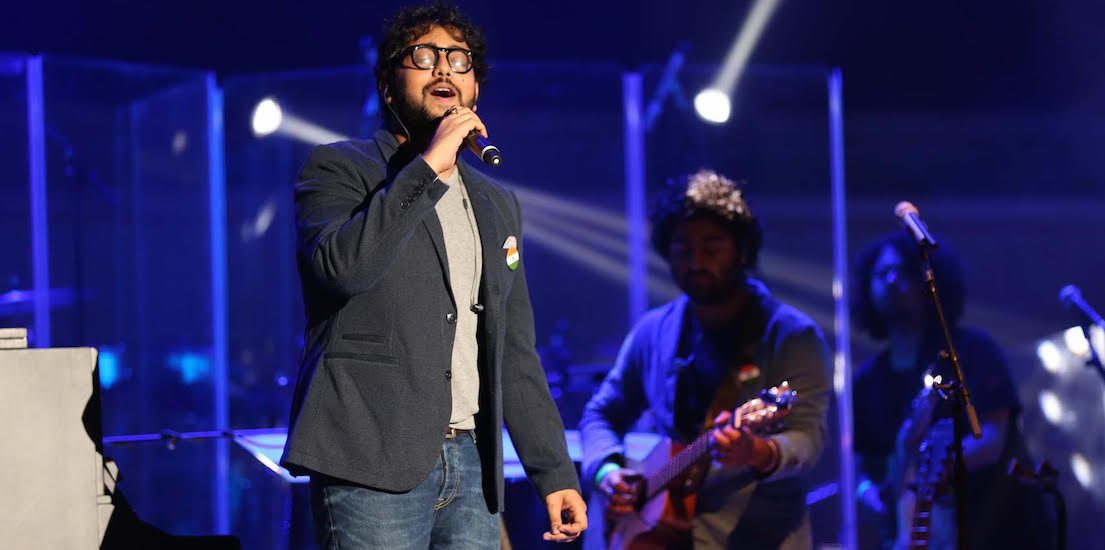I can’t list how much I’ve learnt from Rahman sir – Shashwat
With a vague dream and a distant vision of lending his voice to characters and his music to films, little had Shashwat Singh thought he would move to the city of dreams. In a candid chat with Pandolin, the singer, and aspiring storyteller, talks about the leap life has taken for him through associations with the Mozart of Madras, Bollywood chartbusters and the upcoming epic, Mohenjo Daro.

Shashwat Singh
What was your inspiration to become a singer? What attracted you to it?
I actually started when I was a kid. My brother used to play the guitar and compose. He did not undertake music as a profession but he was my initial inspiration. My mother sings as well. So it was all in the family. To take it up as career was a conscious decision of course. Once I finished my schooling, I wanted to make it to the army. But unfortunately I met with an accident and that couldn’t happen. By that time, I was already performing in school, and when I was informed that I won’t be able to be a part of the army post my injury, I decided that I wanted to take up singing as my career.
READ: WE NOW LIVE IN A WORLD WHERE MUSIC BELONGS TO EVERYONE – MIKEY MCCLEARY
Was there a formal training process you went through to become a singer? Is there a style bracket you put yourself in?
I didn’t go through any voice training as such but I did undertake lessons in piano and western classical theory at the KM Conservatory (Chennai). I plan to take classes for voice training now and am figuring where to take those classes, which guru to go to etc. About the style, semi-classical or Sufi is something I normally sing, but if you ask me personally, I love to sing romantic songs.
Despite coming from a completely non-musical family, you have been associated with some really big names in music, including A R Rahman. How has that journey been?
Honestly, even today, I pinch myself to know if this is real. I mean I could call it pure luck, because I was called for a chorus recording for Rahman sir, and he asked me to stay back after the recording. Later on, he made me sing, and liked my voice (smiles). The journey began there and then he kept calling me for different things until I finally got ‘Wat Wat Wat’ for Tamasha and then ‘Sarsariya’ for Mohenjo Daro.
How did Mohenjo Daro come about?
This one has an interesting story behind it. I went for the scratch recording and I didn’t know if I would be selected. So it was me and Shashaa Tirupati on the track. Once the recording was done, I told her I really really wanted the song. The tune was so good, and the music around it was done so nicely, that I really wanted it. For about six months, I did not know what was happening with the song. It was only when I went for another recording with (Rahman) sir, did he tell me that my song was coming out. That moment, when I got the news, that too from him, it was exceptional.
WATCH : MOHENJO DARO | TRAILER

During one of this performances
You also sing in various other regional languages. How easy or difficult is that?
I understand a little bit of those languages, but I can’t have a conversation in any of them. I write down the lyrics in either English or Hindi, whatever is suitable to understand the mood or tone and then sing it accordingly. Plus, the lyricists are always there to help with the pronunciation or meaning and that makes it much more manageable.
And you’re also an independent musician who writes and produces his own songs. How is that different from being in the industry?
To begin with, it is independent from the commercial space. I can be what I want to be in my song. I can write what I feel like writing, and express in whatever way I want. That is a freedom that this template gives me as an artist. But of course for this you have to know your music thoroughly. Plus, whatever zone you are in, the song can embody that. For example, if it is raining outside right now, I can write about that. You do not have this liberty in the commercial space. No matter how terrible a day you have had, if you have to go record a romantic song, you have to do it. But even that feeling is great. It is a challenge you throw at yourself, but once it’s done, you go back home with immense satisfaction.
READ: AN INSIDER’S GUIDE TO BEING A MUSICIAN BY AMAAL MALLIK
What is your most important take away from your journey so far?
There is a lot to learn actually. Personally, singing is not something I want to restrict myself to. I am also interested in stories and I love Bollywood as a whole. New filmmakers and interesting stories are all around you right now, so their approach is something to learn from. Musically speaking, I can’t list how much I have learnt from (Rahman) sir.
How do you see the way forward?
I would like to work with more and more composers here. Explore more stories, convey more ideas and see where this leads me (smiles).


